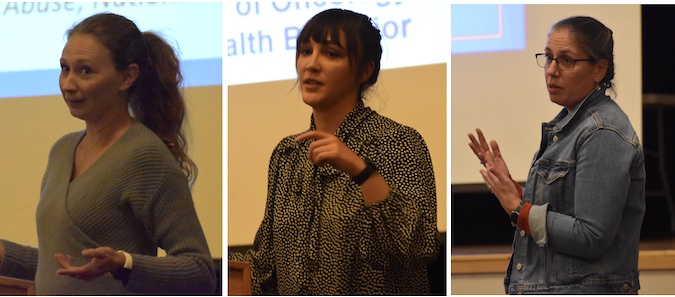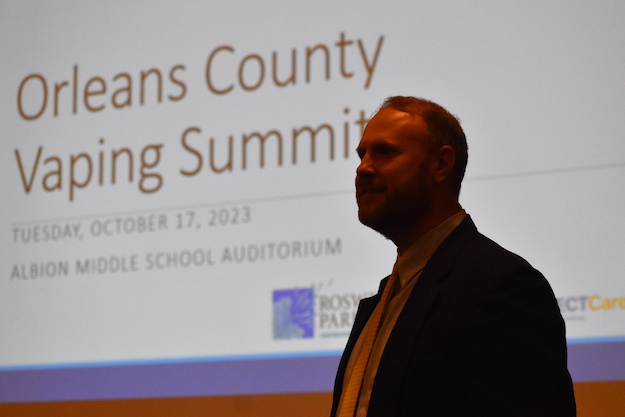At forum, health experts say vaping has many teens in its grip
Many students addicted to vaping, with unknown long-term health effects

Photos by Tom Rivers: Mary Wright, a prevention education with UConnectCare (formerly GCASA), discusses some of the signs of a vaping addiction including difficulty with concentrating on school work when can’t vape, inability to go anywhere without the vape and taking a few puffs, and strong cravings to vape when waking up in morning and going to bed at night.
ALBION – Many students in middle and high schools are addicted to vaping, and battle strong cravings to vape during school days.
That is a problem, not only due to the unknown long-term health consequences of vaping, but also because vaping is prohibited on school campuses and people under 21 can’t legal buy vaping or tobacco products.
Despite that, health officials at a Vaping Summit in Albion estimate 10 to 20 percent of teen-agers are chronic vaping users.
“Vaping is a serious public health issue facing the youth in our community,” said Paul Pettit, public health director in Genesee and Orleans counties.
He spoke at the Vaping Summit in the Albion Middle School Auditorium, the first summit in either Orleans, Genesee or Wyoming counties.
Vaping has become popular among middle and high schoolers in the past seven to eight years, health experts said at the forum, with many parents thinking vaping is less harmful than smoking cigarettes. Vaping also is comes in thousands of different flavors, and many are candy flavored adding to the impression that they are safe and healthy.

Speakers at the Vaping Forum included from left: Kristina Hawes, senior health project coordinator at the Wilmot Cancer Institute in Rochester; Dr. Danielle Smith, assistant professor at Roswell Park Comprehensive Cancer Center in Buffalo; and Mary Wright, prevention educator for UConnectCare, formerly GCASA.
But the health experts say vaping often comes in stronger nicotine concentrations than cigarettes, and the users become very distracted and irritable if they can’t vape, especially during several hour stretches during the school day.
“It is a nicotine stimulant that is very addictive,” said Kristina Hawes, senior health project coordinator at the Wilmot Cancer Institute in Rochester. “With e-cigarettes there is no regulation, there is no standardization of devices or e-liquids.”
She said “Big Tobacco” is using “predatory marketing” to target kids to become users of the products.
The community was urged to not “normalize” vaping. Dr. Danielle Smith, assistant professor at Roswell Park Comprehensive Cancer Center in Buffalo, said many teens see friends and family members vaping and assume it’s OK to use the products.
She urged people to wait until at least 21, and preferably 25, if they are going to try vaping – not when they are a child.
“Don’t use your body as an experiment,” she said.
Mickey Edwards, Albion Central School superintendent, said the district is pushing to educate students about the dangers and addictiveness of vaping.
“We’re trying very hard not to normalize it,” he said during the summit. “We’re giving kids education and not just being punitive.”
He thinks parental acceptance of vaping is one reason vaping is popular among youth.
“The parents may not see it as a problem because they do it themselves,” Edwards said.
Mary Wright works at Albion schools as a prevention educator for UConnectCare, formerly GCASA. She sees students struggle with strong cravings to vape during the school days. Some students give in to those cravings.
Vaping has made those addicted students struggle to concentrate, and maybe get in trouble because they can’t fight off the urge to vape.
Albion has started a “Vape University” as an alternative to suspension with a focus on prevention. Students participate in educational sessions (four sessions on the first offense for possession or use of vaping product). Students are educated about nicotine use and made aware of resources in community for support. Students who decline the sessions through the Vape University will face school consequences per the code of conduct.

Paul Pettit, public health director in Orleans and Genesee counties, speaks at the Vaping Forum on Tuesday evening, the first such forum in either of the counties. Pettit said vaping “is a serious public health issue facing the youth in our community.”
The Vaping Summit included statistics included some results from a 2021 survey among local high schoolers and middle schoolers about tobacco, drug and alcohol use.
Among 11th graders, 18 percent in Orleans County said they tried alcohol within the past month in 2021, while 2.5 percent smoked a cigarette, 13.2 percent tried marijuana and 1.3 percent used a pill, according to a survey of the students.
Among the respondents, 59 percent of 11th-graders viewed alcohol as harmful, while 74.7 percent considered cigarettes bad for their health, 36.0 percent thought marijuana was harmful and 71.7 percent said using pills not subscribed to them was bad.
The local survey didn’t specifically ask about vaping. The National You Tobacco Survey in 2022 surveyed more than 3 million middle and high school students. The survey found that 4.5 percent of middle schoolers regularly use tobacco products and 16.5 percent of high school use those products.
Wright, the prevention educator, said she sees students wrestling and struggling with the impacts of becoming vape addicts. The products can be costly for kids, who don’t tend to have much spending money.
Students say they feel like they are bad role models by vaping around younger siblings or cousins, she said.
There are some immediate health impacts from frequent vaping: sore throat, nose bleeds, headaches and worsening asthma.
Wright said vaping can distract users from other goals, often leading to more isolation.
“This can take over your life and cause you to drop other activities,” she said. “A lot of students have a hard time throughout the day staying focused. They reach for the vape.”
She works with students to develop a “quit plan.” Students, when trying to break free from vaping, often ask friends and family to help them quit by not vaping around them.
Diana Fulcomer, a prevention educator at Medina schools, said parents need to help keep their children from becoming vape addicts.
“Many parents still think I’d rather they be vaping than smoking a cigarette,” she said. “We need to educate the parents, too.”




































































